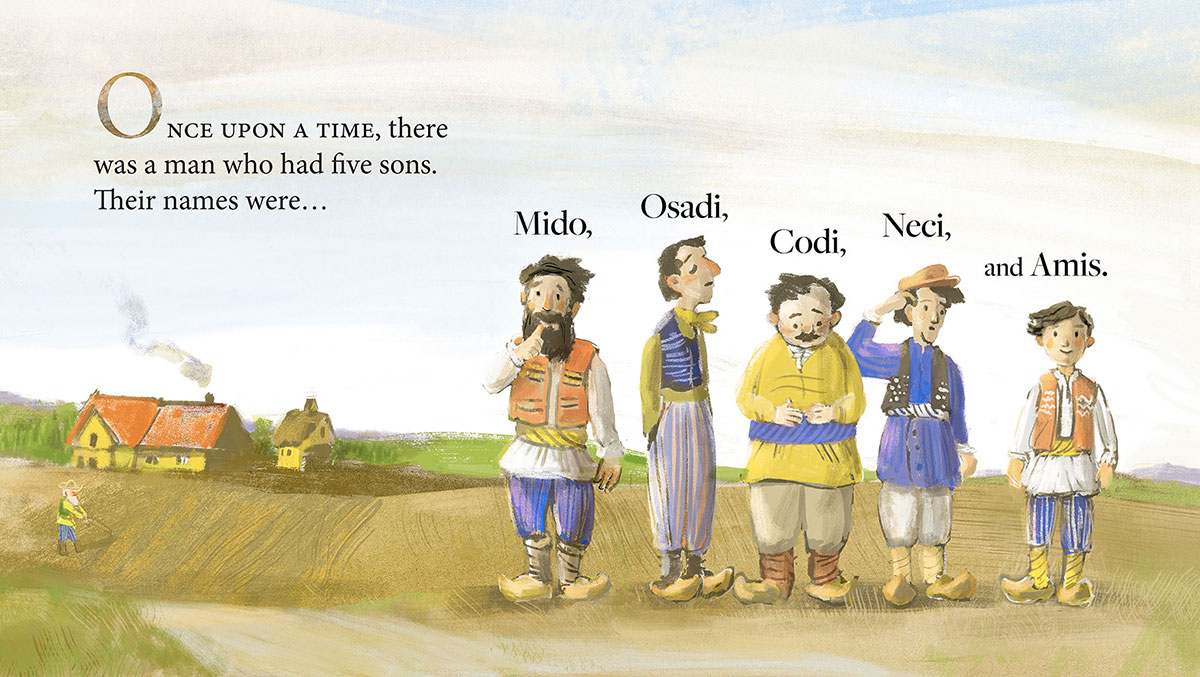
The Father’s Sons
Written and illustrated by members of the 5Sparrows community
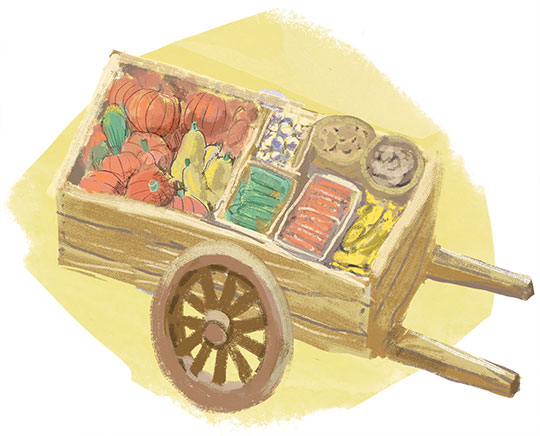
Once upon a time, there was a man who had five sons. Their names were Mido, Osadi, Codi, Neci, and Amis. When they were young, they spent much time with their father. Their father tended a large garden so that he would always have food to send to the villagers.
Many of the villagers, however, had never seen the father and they wondered what he was like. When Mido was no longer a child, he passed through the village on his way to seek his fortune. The villagers pressed him to tell them about his father before he left.
But Mido looked around anxiously and said, “I don’t want to talk about my father. I had to work hard while I was with him and I lived in fear that he would find something wrong with the work I did.”
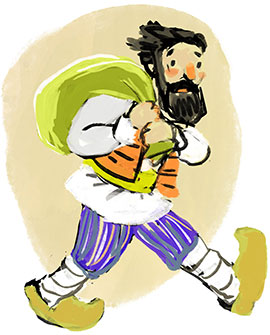
“What happened when he did?” they asked eagerly.
“Well”, Mido stalled. “Often I got sick or had an accident.”
“And your father caused the sickness or accidents?” demanded one old woman.
“It seems likely that he did,” said Mido. “After all, he’s very powerful and he wanted the work to be done well. Now I must be off. I hope to go many miles before dark.”
The villagers began to be suspicious and watch. They noticed that sometimes after the food supply came a villager got sick or had an accident. They began to doubt the goodness of the father.
After a time, Osadi grew up. On his way west, he passed through the village.
“I hear your father is a stern taskmaster,” shouted a villager from behind a shuttered window.
“What do you mean?” demanded Osadi.
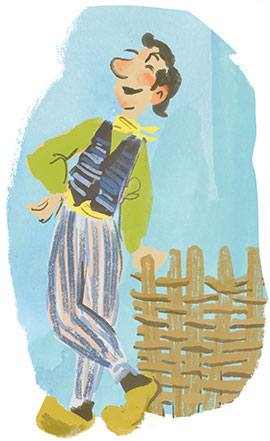
“That’s what your brother told us,” many voices replied at once.
“Mido?” Osadi laughed. “You’d believe that sniveler? He’s afraid of his own shadow.”
The villagers began to assemble in the square. “What’s he really like?” whispered an old, old man.
“He’s a pushover, a softie. I never did any work and nothing ever happened to me. I’m leaving now but I’m sure that if I ever want to come back and live here, he’d let me continue to do as I please.”
With a jaunty step, he bade them farewell.
Now there was division among the villagers. Some still thought the father was to be feared but others thought he should be laughed at or despised.
When Codi left home, the villagers lined the streets. Each camp kept to its own side. They called, “Which one is it? Is your father a stern taskmaster or a pushover?”
“I don’t know what you’re talking about,” said Codi with a frown. “But I’ll tell you one thing. He’s stingy.”
“Stingy?” a young lady questioned. “He sends us all this food. Did he starve you?”
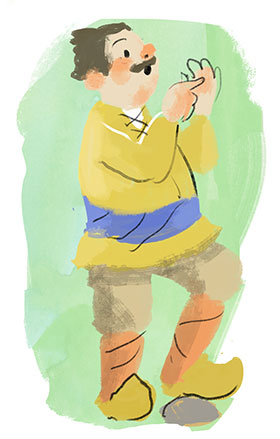
“Well, no not exactly.”
“Did you have a bed to sleep in and clothes to wear?”
“Well, of course, that’s to be expected.”
“Were you deprived of education or amusement?”
“You just don’t understand. Of course, all those things are anyone’s rights. But he was stingy because every day, many times a day, in fact, I’d go to him and ask for things—things he easily could give.”
“And he never gave them?”
“Well, perhaps he gave some. I don’t remember. But he could have easily given them all and he didn’t. You’d think he would have been glad to give them to me. I came to visit him so many times throughout the day. I never wasted his time by coming when I didn’t have a request to make. Anyway, I’m off to look for a place where I can get everything I want for myself.”
The villagers on one side said, “See how mean he is as well as stern!”
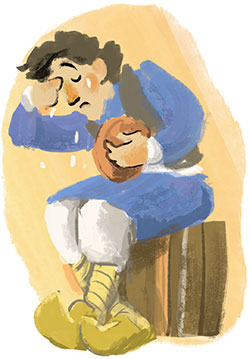
But their opponents said, “See how ineffectual he is as well as soft.”
By the time Neci showed up, many of the villagers were hardly interested in the father. Whichever way you looked at it, he hardly seemed like a pleasant character. But curiosity as to which side was right motivated a few to ask, “What’s your father like?”
Neci gave them a petulant look. “It’s only what’s left of my affection that allows me to call him my father at all. The reason I’m leaving home is to find someone to love me.”
“Your father didn’t love you?” asked a little girl. “Didn’t he kiss you and hug you and give you a kind word?”
“Well, certainly he would kiss me and hug me and say some kind words but it didn’t mean anything. It wasn’t backed up by action.”
“Oh, you poor boy! Did you have to eat by yourself and play all alone?”
“Not exactly. He often was with me but then sometimes he’d be away tending the far fields just when I especially wanted a hug or a kiss. Or he’d be talking with one of my brothers instead of talking to me. Sometimes he didn’t smile at me because he was busy and it was then I knew he didn’t love me.”
As Neci left on his quest for love, the villagers to the right said, “Just what we thought—unloving!”
And the villagers on the left said, “Uncaring.”
The years passed. The father kept sending the villagers provisions but they kept their opinion of him and thought about him as little as possible. They practically forgot that one son still remained at home.
One day, however, it was Amis himself who came to deliver their food. No one really gave him the time of day but he looked so pleasant that it was really rather irksome.
Finally, one of them said, “How come you look so pleasant when your father is such a stern taskmaster?”
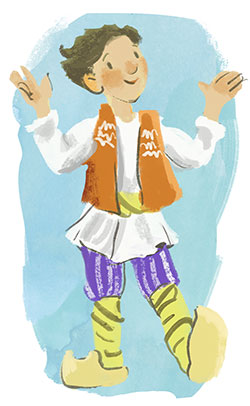
“Where could you get such an idea?” Amis wondered. “It is true we work but since we work together all is joy.”
“It’s like we always thought,” said another. “He’s a pushover and you did whatever you wanted.”
“That’s not quite true,” replied Amis. “I did whatever he wanted.”
“I knew that’s how it was,” said a third. “He was greedy and never gave you anything you requested.”
“Again you miss the mark. He was so generous and good I never had to ask for anything.”
“Well, clearly he had favorites. Your poor brother Neci was just starved for love.”
“Father loves us all. He loved us so much that even when he had to be away or couldn’t give a smile, it was enough for me to sit in his house waiting for his return.”
The villagers watched—some in disbelief, some with mocking laughter, some with fear but one or two with a glimmer of hope as Amis climbed the hill to his father’s house.
